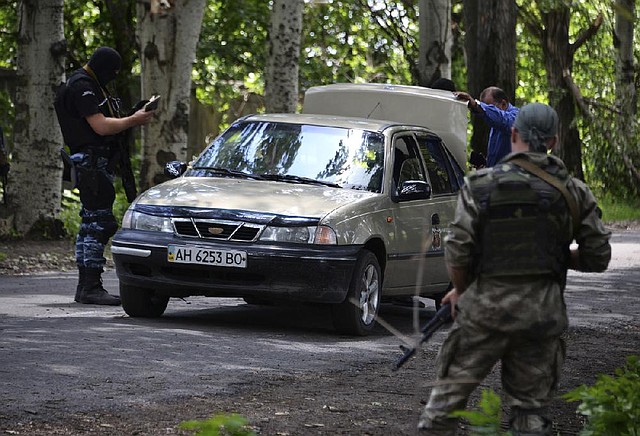Ukraine threatens to end cease-fire
Rebels down copter, killing 9; Putin faults Kiev for air raid
Wednesday, June 25, 2014
MOSCOW -- Ukraine's president warned Tuesday that he may terminate a week-long cease-fire early after rebels downed a military helicopter, and Russia urged the Kiev leadership to extend the truce and launch talks with the rebels.
President Petro Poroshenko made his statement hours after pro-Russia insurgents in Slovyansk shot down the helicopter, killing nine servicemen. The rebels had pledged Monday to respect the cease-fire.
Poroshenko declared the cease-fire Friday as part of a peace plan to end the two months of fighting between the government troops and the rebels in eastern Ukraine.
The insurgents have fired on Ukrainian positions 35 times since the cease-fire was announced, Poroshenko's statement Tuesday said, instructing Ukrainian soldiers to fire back "without hesitation" if attacked.
"The president doesn't exclude that the cease-fire could be lifted ahead of time, taking into account its constant violation by the rebels controlled from abroad," Poroshenko's office said.
Russian President Vladimir Putin, meanwhile, urged Ukraine's government to extend the cease-fire and start talks with the rebels that would give people in the mostly Russian-speaking east a sense of security and protect their rights.
"We hope that the cease-fire will be extended and it will be used for substantive talks," Putin said on a trip to Vienna.
Speaking shortly after the helicopter was shot down, Putin blamed Ukrainian forces for breaking the cease-fire Tuesday by launching an airborne raid in Slovyansk, the flash point in the two-month insurgency. He did not mention the downing of the helicopter.
Earlier Tuesday, Putin asked the parliament to cancel a resolution, which he once favored, sanctioning the use of Russian military force in Ukraine. Poroshenko heralded the move as a "practical step" toward bringing peace to a region roiled by a separatist insurgency.
A Kremlin statement said Putin asked the head of Russia's upper house of the parliament to cancel his March 1 request authorizing the use of force on Ukrainian territory. The chamber is expected to do so today.
Putin said he made the decision to "help create conditions for peace process," but added that Russia will continue to protect the rights of Russian speakers in Ukraine. "I hope that armed forces will not be needed for that," he said.
The European Union, which is meeting Friday, has warned it could introduce new sanctions that would target entire sectors of the Russian economy if Moscow fails to help de-escalate the crisis.
The Brussels-based ambassador of one EU member state, speaking on condition of anonymity because of the sensitivity of the subject, said Russia's actions appear finely calibrated to fall just shy of the threshold that would trigger new retaliatory economic measures by the bloc.
Putin made the request to the parliament for the use of military in Ukraine on March 1, days after Ukraine's pro-Russian president was chased from power after months of street protests. Russia sent troops that quickly overran Ukraine's Black Sea peninsula of Crimea, setting the stage for Russia to annex it after a hastily called referendum.
In April, a mutiny broke out in eastern Ukraine, where pro-Russia insurgents seized official buildings, declared their regions independent and fought government troops. The U.S. and NATO have accused Russia of supporting the rebellion with troops and weapons, but Moscow has denied that.
The United Nations assistant secretary-general for human rights estimated Tuesday that 423 people were killed between April 15 and June 20 in the fighting in eastern Ukraine.
Ivan Simonovic told the U.N. Security Council that Poroshenko's peace plan and cease-fire were "a positive step in the right direction," but he painted a grim picture of the conflict in the east.
The flow of weapons and recruits to armed groups is increasing. Human rights abuses by the separatists are increasing, and lawlessness and criminality continue to rise. Reports of enforced disappearances and excessive use of force during government security operations are increasing, and the situation of journalists is "alarming," Simonovic said.
Over the past two weeks, he said, the number of Ukrainians who have fled their homes has doubled, with 15,200 moving within the eastern Donetsk and Luhansk regions.
As of June 23, the U.N. refugee agency has identified more than 46,100 internally displaced people -- 11,500 from Crimea and nearly 34,600 from the east, he said.
Simonovic said hospitals in the east remain overcrowded and understaffed, and up to 10 are now closed. Medical supplies are low.
He also said about half the population in Donetsk is experiencing some problems with access to water, and food prices have skyrocketed, with seasonal vegetables now 4 to 5 times more expensive than before.
Information for this article was contributed by Laura Mills, Nataliya Vasliyeva, Balint Szlanko, Edith M. Lederer and John-Thor Dahlburg of The Associated Press.
A Section on 06/25/2014

